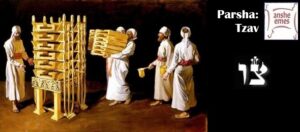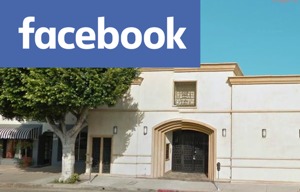I. Summary
A. T’rumas Hadeshen. The Kohadutnim were given the mitzvah of “T’rumas Hadeshen” — lifting the ashes of the daily “Olos” (Consumed Offerings). They were also told to keep the fire on the altar burning continuously. Aharon, the Kohein Godol, was instructed to bring to bring a meal-offering each morning and evening.
B. The Kohanim’s Duties. Additional laws were given specifying the Kohanim’s duties and the portions of the offerings they were to receive as their due. They could eat of the meal, sin, and trespass offerings only if they were ceremonially clean, and only with a Court of the Sanctuary.
C. Installation Ceremony. In an impressive ceremony conducted in the Court of the Sanctuary, Aharon and his sons were installed in their offices by Moshe, with the assembly watching. After the Kohanim had bathed, Moshe dressed Aharon in his distinctive garments, and anointed the Tabernacle and its contents (the Ark, Table of Showbread, Candelabra, and Altar of Incense), as well as the Altar of Burnt Offering, and the laver and its base (all of which stood in the Court of the Sanctuary). He then poured the anointing oil upon Aharon’s head, thus sanctifying him. Finally, the regular Kohanim were invested with their garments. A sin-offering and burnt-offering were then brought by Moshe. These rites were repeated for seven days, during which Aharon and the sons remained within the Court.
II. Divrei Torah
A. Lil’Mode U’Lilamed (Rabbi Mordechai Katz)
1. Not embarrassing others. There was no particular place specifically designated for bringing the sacrifice of the “Korbon Chatos” (the sin offering), in the Miskhan. This is significant. The Korbon Chatos was offered by one who had sinned and now wished to repent. If there was a specified location for these sacrifices, the sinners’ identity would become readily known, and this might in itself discourage repentance. Because the Korbon Chatos was offered in the same place as the Korbon Olah, no one could be certain if the bearer of the Korbon had actually sinned. In this way, the matter would remain a private one between man and G-d, and the sinner would be spared public embarrassment. If Hashem’s Torah laws deliberately avoid the shaming of others, then we should certainly be careful not to embarrass our fellow man. Chazal say that whoever insults his fellow man in public forfeits his place in the world to come. (Bava Metziah 59a). The reason is a simple one. One can kill a man only once with a knife, but he can slay him many times over with a shameful word. Rabbi Akiva Eiger once invited a poor man to his home on Friday night. At the meal, a beautiful white tablecloth covered the Shabbos table. When the poor man lifted his glass of wine, it slipped out of his hand, and the red liquid spilled over the pure white cloth, leaving an ugly blotch. Seeing the poor man squirm in embarrassment, Rabbi Eiger immediately lifted his own glass of wine, and also “accidentally” spilled it over the tablecloth. As the poor man looked on in great relief, Rabbi Eiger remarked, “it seems as if the table or the floor is shaking, doesn’t it?” He had been willing to make himself look careless (and to soil a nice tablecloth) just to spare the shame of another.
2. Sincere devotion, not mere habit. The word “Tzav,” which begins this Parsha, means “Command”. It is deliberately expressed in a form that can refer to both the past and the future. In other words, Hashem’s commandments are as applicable today as they were when first promulgated. The rules governing man’s behavior and man’s devotion to G-d are timeless. Consequently, our observance of the Torah should not be marked by tired, listless efforts. When we pray, we should not mumble through the prayers out of habit. Rather, we should remember Whom we are addressing, and say each word carefully. The same applies to observance of Shabbos, our Torah learning and other mitzvos. They should not be routine, but rather should be moments of inspiration. We must view the Torah and our prayers as instructions from Hashem on how to act practically. If we do not realize this, and do not actually practice what we say and learn, our words and learning have no meaning or purpose.
B. Growth Through Torah (Rabbi Zelig Pliskin)
View each new day as the first day of your life. “Then [the priest] shall take off his garments and put on the other garments and carry forth the ashes out of the camp onto a pure place”. Rabbi Samson Raphael Hirsch commented: the taking out of the ashes that remained on the altar from the previous day expresses the thought that with each new day the Torah mission must be accomplished afresh, as if nothing had yet been accomplished. Each new day calls us to our mission with new devotion and sacrifice. The thought of what has already been accomplished can be the death of that which is still to be accomplished. “Carry forth the ashes out of the camp.” Every trace of yesterday’s sacrifice is to be removed from the hearth on the altar, so that the service of the new day can be started on completely fresh ground. The past is not to be forgotten. But it is to be retired to the background, and is not to invest us with pride before the fresh task to which each new day calls us.
C. Wellsprings of Torah (Rabbi Alexander Zusia Freidman)
Keeping the fire burning. “And the fire of the altar shall be kept burning thereby”. “Bo,” the Hebrew word for “thereby” may also be rendered as “within” a person or thing. Hence, this specification may be construed to mean that “the fire of the altar shall be kept burning within him”; — i.e., that the zeal of sacrifice is to be kept burning within the Priest (Aharon and each of his Priestly descendants) to whom the commandment was addressed. This is also a reminder to us that we should constantly keep the fire of Torah burning within ourselves.
D. Peninim on the Torah (Rabbi A.L. Scheinbaum)
The Offering of Thanksgiving. “If he offers it for Thanksgiving”. The Midrash explains that in the Messianic Era, all sacrifices will become void, with the exception of the Korban Todah, the Offering of Thanksgiving. Similarly, it is taught that all prayers will be abolished in the future except for those of thanksgiving. Why is there a need for thanksgiving in the Messianic Era? Thanksgiving is expressed in acknowledgment of Hashem’s beneficence by who has been rescued from grave peril. This sacrifice is, therefore, man’s method of expressing his belief that Hashem actively guides every aspect of his life. During the Messianic Era, man will not lack anything, for the world will be the essence of perfection. Why would he then have to offer thanksgiving? HoRav Chaim Zaichyk, zt’l explains that, indeed, the basis for thanksgiving will be different during the Messianic Era. Gratitude will no longer be expressed for the present, but will be conveyed retroactively for the past. Man’s perception of Hashem’s conduct will be greatly enhanced. Past events, which may have seemed so painful, will be perceived as a vehicle for our spiritual development. We will consequently realize that everything that Hashem has done has been for our benefit. This recognition will ultimately serve as a source of our gratitude to Him.
E. Darash Moshe (Rav Moshe Feinstein, zt’l)
Count your blessings each day. There are two meal-offerings which can only be brought by a Kohein. One is offered the first time a Kohein performs a temple service, and when a Kohein Gadol assumes his new office. The other is offered everyday by the Kohein Gadol. It is noteworthy that the Kohein Gadol brings each day the identical offering, that of the day of his induction. This is because, although Hashem grants him a special position, is to be considered like a new gift each day. Although it was already given to him and to his descendants, it is theirs only if they deserve it. Hence, the position of Kohein Gadol is like a gift being granted anew. From here we learn that any blessing or appointment that Hashem gives must be continually deserved and the recipient must contemplate and appreciate it every day.
F. Living Each Week (Rabbi Abraham Twerski)
1. Overcoming negativism. “The flame of the altar shall burn in it. Do not extinguish it.” The pronoun “in it”, referring to the altar as the antecedent, or to the Kohen as the antecedent, in which case the verse reads, “the flame of the altar shall burn within the Kohen,” indicating that the service in the Sanctuary should kindle a fiery devotion “within” the Kohen. Throughout Jewish history there are records of people who are so intensely absorbed in prayer that they virtually lost contact with their surroundings. The Talmud states that when Rabbi Akiva prayed the Amidah, which requires one to remain stationary, he would begin praying in one corner of the room, and later be found in another corner because he would so completely lose himself in meditation that he was unaware that he was moving about (Berachos 31a) . This is the kind of intensity and devotion in prayer that characterize many of our Tzaddikim, and this may be the meaning of the above verse, that the flame of the altar should burn within the person. The latter part of the above verse also lends itself to another interpretation. The literal translation of “do not extinguish it,” can, according to Rabbi Shneur Zalman also be interpreted as “you must extinguish the negative.” In other words, rid yourself of all negativism. It is no coincidence that these two concepts are contained in the same verse, because they are related. It is Rabbi Akiva, in whom the fiery devotion was manifested in his prayers, who said that the principle that underlies all of Torah is “love your neighbor as yourself.” It is Rabbi Akiva who also said that man is precious because he was created in the Divine image, because he saw godliness in everyone. Apparently, the two traits go together. Should they agree that one is consumed by a burning desire to be close to G-d, to that degree can one eliminate negativism, even to the point of finding redeeming features in the most negative occurrences.
2. Miracles Within Nature. “The flame of the altar shall burn in it. Do not extinguish it”. The Chinuch states that although the flame that burns on the altar was of Divine origin, there is a mitzvah to constantly fuel the flame on the altar, so that the Divine nature of the flame is not manifest. Following our establishment as a nation in our land, miracles that were manifest and undeniably supernatural were infrequent. From then on, the conduct of the world appeared to follow immutable natural laws. It is a principle of Judaism, however, that G-d is constantly at the helm, and that He operates through the “natural” laws. Hence, the natural and supernatural are really one and the same. The truly wise person can see Divine providence in all “natural” phenomenon.
3. Expressing Gratitude. “If he offers it by reason of gratitude.” In the absence of the Sanctuary, the gratitude service consists of reciting a special Berachah (blessing) in the presence of a Minyan (Quorum of 10). The text of the Berachah is, “Blessed are you, oh G-d, King of the Universe, Who does good to the undeserving and Who has rendered every kindness to me.” The congregation then responds, “May He Who rendered you every kindness continue to do good to you.” Expressing gratitude to G-d is a central theme in Judaism. The first words one utters upon awakening in the morning are “Modeh Ani” (“I thank You G-d”) in which one expresses gratitude for another day of life. Our prayers and blessings are bound with expressions of gratitude, through which we enforce one’s belief in the Divine Providence, and in the belief that all that one receives is a Divine gift rather than solely the result of one’s own efforts.
NEXT WEEK: SHEMINI




 Visit the group and request to join.
Visit the group and request to join.
